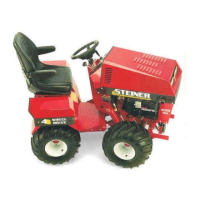09-367 4 - 4 rev 12/98
section 4 OPERATION
OPERATING PRECAUTIONS
•
Observe all Safety Decals.
•
Keep all Shields in place.
•
Do not allow minors or the inexperienced to
operate machine. NO RIDERS!
Slow down on rough, uneven or steep terrain and
for operation of power driven mounted
attachments.
•
Do not operate mower with other persons in the
area. Irregularities in ground surface can permit
foreign material to be propelled from beneath
deck to cause serious injury or death.
• Before leaving operator's seat, disengage PTO,
set PARKING BRAKE and STOP ENGINE.
• Remove key from ignition if maintenance
procedures are to be performed or tractor is to
be left unattended.
Stop running the unit at the first sign of any
abnormal hydraulic function. Serious damage to
the hydraulic system can result.
Rear weights must be used with attachments over
120 pounds for stability. See attachment
operator's manual for weight requirements.
Always remove all rear weights when front
mounted attachments are removed, or when using
attachments less than 120 pounds, to reduce the
danger of unit tipping over backward while
climbing steep slopes or loading ramps.
OPERATING INSTRUCTIONS
1. Read and understand this manual before
attempting to operate this machine.
2. Check all fluid levels before starting unit.
3. Become familiar with all controls and their
functions.
4. Safety interlock requires the Forward - Reverse
control lever to be in the neutral position to start
engine.
5. Select desired engine speed with the throttle.For
power driven attachments, the engine is normally
run at maximum RPM.
6. Vary vehicle speed with the Forward - Reverse
control lever. If the attachment or a steep slope
causes excessive drop in engine RPM; reduce
ground speed. Do not lug the engine at reduced
RPM. Do not make sharp turns at high speeds.
Always look before backing.
7. Operate mower and other similar front mounted
equipment with front lift lever in “FLOAT” position.
8. Safety seat switch requires operator to be seated
when PTO is “ON” or engine will stop. Disengage
PTO before attempting to start engine.
9. The hydrostatic transmission provides a braking
action when the Forward - Reverse control lever is
returned to neutral.
10. Set parking brake and stop engine before
dismounting.
11. DO NOT TOW! Serious damage to hydraulic
system will result. See Section 4.6 for emergency
moving instructions.
12. Be alert for loose bolts and nuts. It is the operator's
responsibility to keep bolts tight.
13. Tire pressures are very important! Check tire
pressures according to Service Schedule.
(Section 5.1)
14. See the following pages for more information on
specific operator controls and adjustments.
TIRE BALLAST
Liquid, foam, rubber or powder ballast in tires
causes excess loads on the drive train. Failures
caused by excess loading may not be covered by
warranty.
Modified or makeshift weights are not acceptable.

